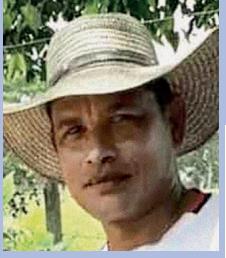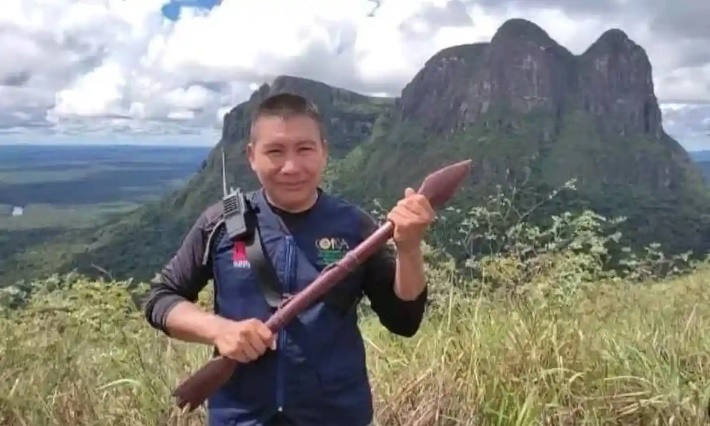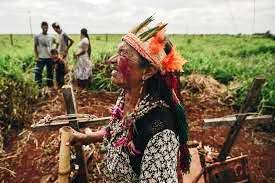This month we bring you news from Argentina, Brazil, Colombia, Ecuador, Peru, Uruguay and Venezuela and a new Urgent Action on Colombia. We report on the plight of female Venezuelan refugees in Colombia and Peru, and the ongoing serial killings of human rights defenders in Colombia. We review Amnesty’s two new updates on human rights in Argentina and Peru relating to their UN Universal Periodic Reviews, ongoing issues with impunity in Uruguay and a new report on extreme violence in Ecuador’s prisons. There has been another mass killing by Rio police in one of the favelas, a killing of an indigenous leader in Venezuela, and attacks on indigenous peoples by police in Brazil. There is good news from Colombia’s Senate which has started the country’s ratification of the Escazú Agreement.
VENEZUELAN REFUGEE WOMEN IN COLOMBIA AND PERU
In a new report, Amnesty has accused the Colombian and Peruvian states of being largely absent when it comes to guaranteeing, protecting and respecting the right to a life free of violence and discrimination for Venezuelan refugee women, who face gender-based violence in all areas of life, Unprotected: Gender-Based Violence Against Venezuelan Refugee Women in Colombia and Peru. Colombia and Peru have received the largest numbers of Venezuelans fleeing human rights abuses in their own country, together hosting more than 50% of all those who have fled Venezuela.
COLOMBIA

Amnesty International has issued a new Urgent Action on Colombia. On July 5th, Yuli Velásquez, President of the Federation of Santander Fishers for Tourism and Environment (FEDEPESAN), was the victim of an armed attack. Two unknown assailants shot at her, harming her bodyguard. Members of FEDEPESAN have previously suffered other armed attacks and threats. We urge Colombia’s National Protection Unit (UNP) to grant protective measures to Yuli that adequately respond to the level of risk Yuli and FEDEPESAN members are facing.
Amnesty’s report Unprotected (see above) finds that in Colombia Venezuelan women face multiple forms of violence in public spaces, at home and at work. Despite this, they are denied access to justice and health services because of stereotypes related to their gender, nationality and gender identity, among other factors, which also mean they experience new forms of violence and discrimination when they try to file a complaint.
Accompanying the report Unprotected is Amnesty’s Facts and Figures on this gender-based violence against Venezuelan refugee women. In Colombia, 122,000 cases of gender-based violence were reported in 2020 alone. One in four said they had experienced discrimination and of these over half said they had suffered violence in the street.
Programa Somos Defensores (Programme We Are Defenders) report 53 killings of Human Rights Defenders and Social Leaders in the first quarter of 2022, almost double compared to the same period for 2021. Of those perpetrators identified, ex-Paramilitaries were most numerous followed by FARC Dissidents and the Armed Forces. Killings occurred across over half the country’s departments. Indigenous leaders were again especially targeted.
Colombia’s Senate has ratified the Escazú Agreement, a first step which would give local communities much more say over the environment and control over extraction of resources. These include the rights of access to information about the environment, public participation in environmental decision-making, environmental justice, and a healthy and sustainable environment for current and future generations. The approval brings the agreement one step closer to being ratified in Colombia as a whole, pending two more debates and votes in the House of Representatives, the Commission and in the plenary. Finally, the agreement would be signed by the President.
VENEZUELA
 A Venezuelan indigenous leader, Virgilio Trujillo Arana, who led community defence from criminal groups and illegal mining, has been gunned down in broad daylight in the city of Puerto Ayacucho. Trujillo served as the coordinator of the Indigenous Territorial Guard in the Autana municipality, in the state of Amazonas in southern Venezuela. He was also the founder of Ayose Huyunami, a unit defending Indigenous lands from criminal groups and illegal mining.
A Venezuelan indigenous leader, Virgilio Trujillo Arana, who led community defence from criminal groups and illegal mining, has been gunned down in broad daylight in the city of Puerto Ayacucho. Trujillo served as the coordinator of the Indigenous Territorial Guard in the Autana municipality, in the state of Amazonas in southern Venezuela. He was also the founder of Ayose Huyunami, a unit defending Indigenous lands from criminal groups and illegal mining.
PERU
In its submission to the latest United Nations Universal Periodic Review of Peru’s human rights performance, Amnesty has raised concerns about gender-based violence, the rights of LGBTI people, violence against human rights defenders, violations of the right to freedom of peaceful assembly and the rights of migrants and refugees.
The UN High Commissioner for Human Rights Michelle Bachelet made an official visit to Peru from 18 to 20 July, during which she held discussions on the country’s human rights challenges and opportunities. Her concluding press statement is here.
ECUADOR
In a new interactive report documenting one of Ecuador’s deadliest recent prison massacres, Human Rights Watch demonstrate how overcrowding and lack of state control in the prisons have enabled gang members detained in them to commit several massacres that have taken the lives of over 350 detainees since 2021.
URUGUAY
A delegation of the UN Working Group on Enforced or Involuntary Disappearances made an official visit to Uruguay in July. At the end of the visit, it called on Uruguay to end decades of impunity for human rights violations by stepping up efforts to search for disappeared persons and bring perpetrators to justice. Presenting its preliminary observations, the Working Group stressed that, to date, there had been no comprehensive exercise to clarify the truth regarding human rights violations in Uruguay.
BRAZIL

The Inter-American Commission on Human Rights (IACHR) and the Regional Office for South America of the UN High Commissioner for Human Rights (OHCHR) stress their major concern about the attacks, threats, and acts of intimidation reported by several indigenous peoples in Brazil. On June 24, 2022, two Guaraní and Kaiowá indigenous communities in Mato Grosso do Sul were victims of armed attacks conducted jointly by military police officers and civilians, who were trying to evict them from their ancestral lands. Officers fired shots from the ground and from a helicopter, reportedly killing one indigenous person and injuring more than 10 (including women and children). Both institutions urge the Brazilian State to investigate these cases to punish the people responsible for them, as well as to take urgent, effective action to protect the lives and integrity both of these peoples and of the individuals who advocate for their rights.
Al Jazeera (Youtube) report on another mass killing by police in one of Rio’s slums, Alemao. At least 18 people were killed in the latest police raid targeting organized crime groups in Rio de Janeiro’s favelas. Among the dead was a woman bystander ‘caught in the crossfire’. The operation involved around 400 officers, four aircraft and 10 armoured vehicles.
ARGENTINA
Amnesty International has made a submission for the fourth Universal Periodic Review that took place on the 23rd of January 2022. In this occasion, Amnesty International has raised concerns on:
Sexual health and reproductive rights: Despite the approval of Law No. 27.610, women and people who can become pregnant continue to face significant challenges in accessing legal abortion due to the lack of availability of sexual and reproductive health services, the lack of training of health providers and geographical distances – sometimes over 300 km- to access to the service. No public campaigns to disseminate information about the law have taken place.
Violence against women: In 2021, a femicide was registered every 35 hours, with 81% of the 251 deaths resulting from gender-based violence occurring in contexts of domestic violence. In 2020-2021, 3,129 children were registered as victims of sexual abuse. Despite the public attention given to the fight against gender-based violence, prosecution and trial rates are low: only 15.5% of reports of crimes against sexual integrity result in convictions. Free legal representation for victims of gender-based violence is inadequate to guarantee effective access to justice
Excessive use of force and enforced disappearances: In 2020, the National Public Defender’s Office received 141 reports of abusive use of force by police officers on public roads. Between 2020 and 2021, there were 209 deaths and five possible enforced disappearances. The lack of a unified and comprehensive public record of institutional violence cases hampers an understanding of the magnitude of the problem and the implementation of adequate solutions.
Indigenous rights: Indigenous peoples continue to face serious difficulties in accessing collective land rights. In 2021, the government approved the extension of Emergency Law 26.160 ordering the suspension of evictions of Indigenous communities. Despite Argentina’s support for a recommendation to conclude territorial surveys of the lands occupied by indigenous communities mandated by the same law, only 43% of the survey was completed by the end of 2021.
Amnesty International also raised concerns on migrants and refugee rights and climate crisis. You can read the full report in English here.
South America Team – Richard Crosfield (Colombia and Brazil), Carla Torres (Chile and Argentina), and Graham Minter (rest of South America).